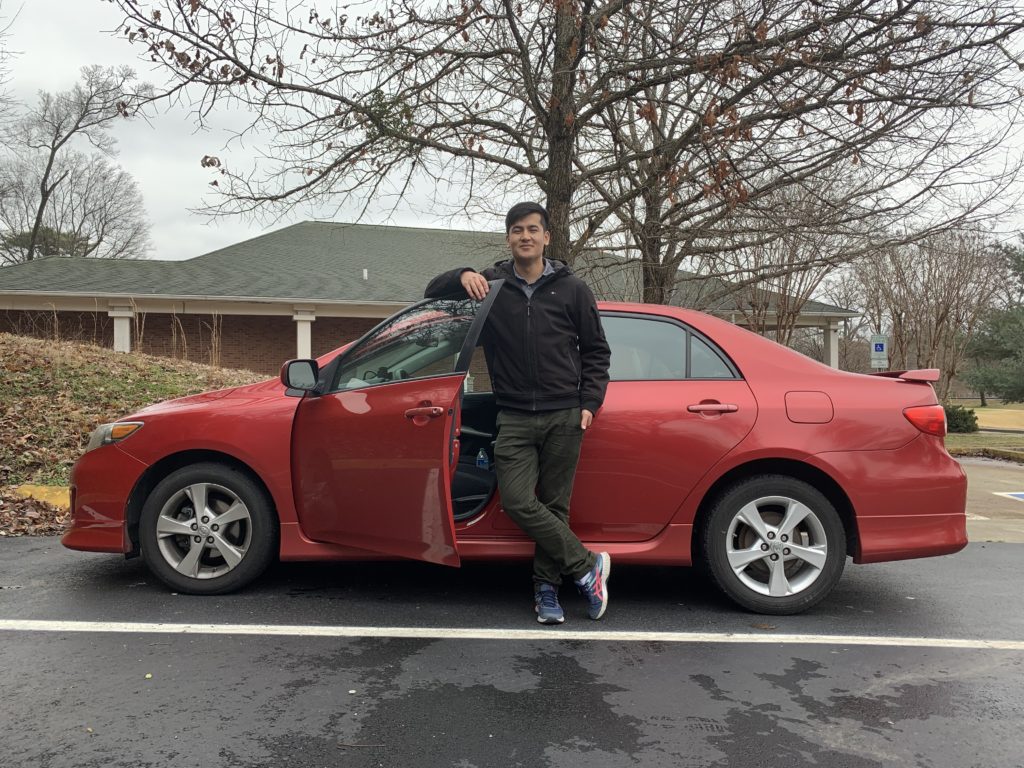
For many of the more than 300 Afghan refugees who attended the Islamic Center of Nashville’s December welcome dinner, this was the first chance to see what life will be like in Tennessee.
It was also a chance to meet others who fled Afghanistan after the Taliban took over the country in August. Among the newcomers at the mosque on 12 South that night were Ali Reza Rafat and Souroush Ekhteyar, who both lived in Kabul before the takeover.
For 29-year-old Ekhteyar, getting out of Afghanistan was about keeping his two small children safe.
“We are responsible for them, to make for them a bright future, a good future,” he said.
His wife, Fatima, worked for the Afghan military, and both have family members who occupied high positions in the government.
They are also Hazara, which is a minority ethnic group that was brutally persecuted by the Taliban in the 1990s. The couple knew they had to get out of the country as soon as possible.
The journey to the Kabul airport
Almost immediately after the Taliban takeover, Fatima went into labor. She gave birth to their son, Farnham, to the sound of motorcycles patrolling the streets outside the hospital in Kabul.
“Suddenly the Taliban arrived to Afghanistan, especially in Kabul, the capital. So it was like a bad surprise, a bad dream,” she said. “I had a bad delivery, a hard delivery.”
Just two days after giving birth, Fatima caught a taxi to the Kabul airport with Ekhteyar, their newborn son and 4-year-old daughter.
 Rose Gilbert WPLN News
Rose Gilbert WPLN News Souroush Ehketyar with his daughter and son in their home in Nashville.
The gate to the airport was packed with thousands of people trying to leave the country. Ekhteyar said that the crowd allowed them to pass through to the front due to the new baby.
But once they made it inside the airport, Ekhteyar said U.S. soldiers shot tear gas into the panicked crowd.
“When we entered, they shoot the gas (and) my two kids are crying,” he said.
Then they realized that two-day-old Farnham had stopped breathing. They rushed to flag down soldiers, who got the baby to a doctor.
“After ten or 12 minutes, he started breathing again,” said Ekhteyar. “So it was very hard. My wife was still bleeding and hurt, and she’s crying as well. I never forgot this journey.”
They eventually made it onto a plane to Qatar and then to the U.S. After two months in a Texas refugee camp, the family received their final resettlement assignment: Nashville, Tennessee.
“When I arrived to Nashville, I think that I am dreaming,” said Ekhteyar.
It was a huge relief.
Before having to flee their home, Ekhteyar and Fatima had a comfortable life. They were well-connected with well-paying jobs. When they got to Nashville, they didn’t have a car or internet connection.
Rafat on the other hand faced difficulties back in Afghanistan. His father died just a few years ago, and his family was struggling to make ends meet.
“I need money because I’m so worried about my family. Afghanistan is too much poverty. It’s a big worry for me that I should send some money for my family,” he said.
In August, he was studying psychology in Kabul, but he grew up in a village in the Ghazni province. He used to volunteer with a nonprofit that publicly opposed the Taliban. When he heard the Islamic fundamentalist group had taken control of the capital, like Ekhteyar and his family, he knew he needed to leave.
“I went to the airport. There was a lot of people. On the first day I tried to come inside, but the Taliban didn’t let us. They were so crazy and they look like wild animals and they hurt us, everyone,” Rafat said.
The next morning, he tried again. And again. And again.
“Six times I tried. I was there from nine o’clock in the morning, up to four o’clock in the morning,” he said.
Finally, he says he made it onto a flight to Kuwait, then to a refugee camp in Germany and another in New Mexico before he got his assignment.
“They told me, uh, ‘Nashville, Tennessee.’ It was the first time I had heard of Tennessee,” he remembered.
Overwhelmed caseworkers
He arrived here in Nashville with nothing but his phone, wallet, passport and the clothes on his back. When winter came, he needed warmer clothes, but he could not get a hold of his case worker.
Ekhteyar had the same problem with his caseworker.
“We call for him and he said that ‘I am too busy, I can’t come. Lots of refugees, new refugees are coming,’” he said.
The local resettlement agencies had all downsized during the Trump administration and were now overwhelmed by the more than 500 Afghan refugees who were sent to Nashville.
Meanwhile, Fatima was still dealing with long-term health issues from giving birth and had no way of accessing medical care. Ekhteyar’s family also hadn’t heard from anyone about starting their asylum claim that they needed to file within a year in order to stay in the U.S. That’s because they’re here on humanitarian parole, which expires after two years.
“I’m worried about my future,” said Ekhteyar. “For two years, they give us visa. After two years, I don’t know what will happen. They will send us back or we will be in America? So I’m thinking I like to die here, not in Afghanistan. We are Hazara.”
A few days after his family fled Kabul, a friend sent him a video the Taliban beating an Afghan soldier, who had his hands tied behind his back, in front of a crowd.
“He told me ‘If you were here, they would take you out like this,’” said Ekhteyar.
It’s clear that there is no turning back.
 Rose Gilbert WPLN News
Rose Gilbert WPLN News Ali Reza Rafat with his car.
It’s been about five months since the welcome dinner at the Islamic Center of Nashville. Both Ekhteyar and Rafat still have a long way to go, but they’ve both been able to get jobs and start their visa application process for more permanent US residency.
Rafat even took his driving test and bought his first car, which he keeps meticulously clean.
“The last time you came here, I didn’t have any job, any car. So it’s more than one month that I’m starting work. And right now I have a job. And since almost one month I bought a car. Right now, almost, I stand on my own foot,” he said.
“I’m proud of myself that right now I am in America.”


